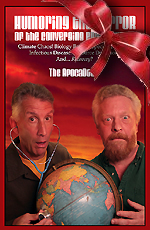SEARCH
A great gift
for crisis deniers!

Humoring the Horror of the
Converging Emergencies
94 color pages
$24.99 now $15!
Or read FREE online!

Twitter

Ping this story
in social media:
del.icio.us
Digg
Newsvine
NowPublic
Reddit
Facebook
StumbleUpon
|
 |
|
 |
|
 |
|
 |
|
Arctic's 'canary in a coal mine' http://apocadocs.com/s.pl?1248799886
Without a microscope, most plankton are easy to miss. And when the tiny marine creatures do come into focus, they aren't much to look at.
Until you peer closer, and listen to what they have to say.
Way down near the bottom of the oceans' food chain, animals known as zooplankton drift on the currents, feeding on each other, eating still lower life forms such as bacteria and viruses, or in most cases, grazing on microscopic plant life, called phytoplankton.
As tiny, and as hard to love, as plankton are, scientists studying them say that if global warming makes things go bad for these organisms, the pain will run all the way up the food chain to humans.
|
|
 |
|
 |
|
 |
[Read more stories about:
canary in coal mine, ecosystem interrelationships, food crisis, global warming]
This item will appear in our PANIQuiz!
|
 |
|
New!:
| |
|
Your Quips:
seadevil says: "Plankton... hard to love? Some of my best friends are plankton."
| |
|
Got a PaniQuip?
|
|
|
We reserve the
right to reuse, remove, or refuse any entry.
| |
|
 |
'Doc Michael says:
|
 |
 |
 |
|
Arrrgghh, matey. We'll be forced to walk the plankton!
|
|
|
|
 |
Want to explore more?
Try the PaniCloud!
|










